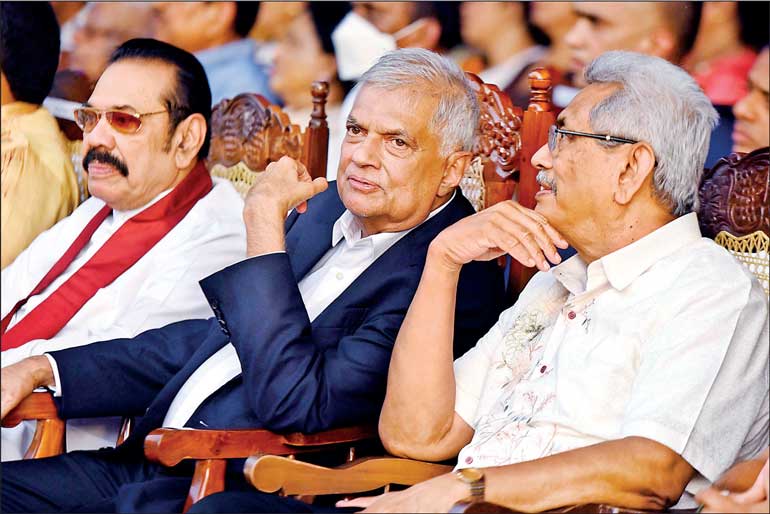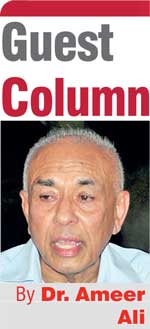Saturday Feb 21, 2026
Saturday Feb 21, 2026
Tuesday, 9 July 2024 00:26 - - {{hitsCtrl.values.hits}}

President Ranil Wickremesinghe in conversation with his predecessor Gotabaya Rajapaksa in the presence of former President and Prime Minister Mahinda Rajapaksa at the ceremony to mark 27 years in politics by SLPP MP Rohitha Abeygunawardena at the Kalutara Public Ground on Saturday – Pic by Pradeep Pathirana
|
 “Anybody who knows about capitalism knows that bankruptcy is an essential part of capitalism” (Joseph Stiglitz)
“Anybody who knows about capitalism knows that bankruptcy is an essential part of capitalism” (Joseph Stiglitz)
Bankruptcy, according to one definition, “is a legal proceeding when a person or business cannot repay outstanding debts or obligations. It offers a fresh start for people who can no longer afford to pay their bills”. What is true for an individual is also true for a country. When Sri Lanka was in the grip of a historic economic crisis and when the Treasury was running out of foreign exchange to fund imports and service foreign debt, talk of an impending bankruptcy or near-bankruptcy started circulating within the financial circles both locally as well as internationally.
The successive downgrading of Sri Lanka’s credit rating by international agencies rang alarm bells, and something far more serious was looming in the horizon. That happened on 5 July 2022, when the new Prime Minister Ranil Wickremesinghe (RW) declared that the country was officially bankrupt. However, to calm the situation at the time, CBSL Chief Dr. Nandalal Weerasinghe maintained in an interview a few days later that “the country was not bankrupt but the Government took a conscious decision to opt for a pre-emptive negotiated default in the largest interest of the country and its people”.
Behind all that verbiage the fact of the matter was the Treasury did not have enough funds to pay for the country’s imports and service the outstanding debt. Economy needed a fresh start to cope with the new situation. However, if one really wants to trace the true origins of this bankruptcy one has to start from the late 1970s when JR introduced his open economy model within a political culture that was unfit to handle an economy open to the vagaries of international capitalism. Otherwise, why was IMF invited 16 times then? Let the economic historians handle this subject.
No sooner RW became President on 21 July, he immediately approached the IMF for the 17th time. IMF accepted the invitation with conditions and the economy since then is moving slowly under its direction. After two years of this incomplete operation, and when President RW is in the thick of a yet undeclared election campaign, he is celebrating the end of bankruptcy and return to solvency just on the back of a deal signed with private creditors over a restructured plan to repay all loans on concessional terms by 2043 the latest. All bilateral loan instalment payments are deferred until 2028.
With IMF sponsoring these negotiations and more importantly – a fact hardly mentioned – the geostrategic importance of Sri Lanka in a growing Cold War in the Indian Ocean, that deal should not come as surprise. Yet, that deal should be welcomed and RW may have something to celebrate over a piece of “good news”. But it does not mean the economy is solvent. CBSL chief who from the outset rejected the bankruptcy description is now logically compelled to object RW’s claim that bankruptcy has ended and solvency has returned. This controversy over nomenclature and RW’s premature claim to victory only reveals that it was not economics but politics that prompted him to declare the beginning and end of Sri Lanka’s bankruptcy. He is now credited by his admirers for lighting the IMF lamp to drive away the darkness which covered the economy since 2022.
Whether one calls it bankruptcy or not the economic condition of a vast majority of Sri Lankans in 2022 was dire. Former President Gotabaya Rajapaksa (GR) and his clan of kleptocrats surrounded by the so-called Viyathmaga experts and the two pliant governors of SLBC, Professor W.D. Lakshman and Greek Bonds fame Nivard Cabraal, dragged the economy along a blind alley in the name of an undefined development path, which ultimately drained the Treasury of financial resources, buried the economy in an ocean of debt, created supply shortages, drove inflation to double digits reaching around 70% and made hunger, malnutrition and even starvation knock the doors of an unprecedented number of households.
That economic disaster which was brewing unnoticeably from 2020 came to a boiling point with the entry of COVID. But while other countries in the region hit by the same pandemic were able to recover and resume economic growth, Sri Lanka was back sliding because of a fundamental systemic crisis which displayed its full horror through the economy. Chaos reigned supreme and the Aragalaya captured the mood of the nation. What happened thereafter is common knowledge and needs no repetition.
Without immediate foreign assistance recovery was unthinkable. With the departure of Mahinda Rajapaksa, RW was virtually dragged from the back seat and put on the PM’s chair and after the resignation of GR, RW was elevated to become the President. Whether it was RW or anyone else occupying that position, he or she would have had no alternative but to approach IMF. Therefore, what RW did was nothing out of the ordinary. Once IMF was brought in RW had to dance according to its tune. His 2022-23 and 2023-24 Budgets as Finance Minister were drawn to satisfy IMF conditionalities than to restructure the economy with measures fundamental and urgent to pull the economy and country out of doldrums.
This is why having monitored the economy’s progress over the last two years and willing to release the third tranche of the $ 2.9 billion EFF, even IMF feels that economic stability and growth are shaky and at knife’s edge. In any case, as one opposition MP remarked, the verdict on the end of bankruptcy should come not from RW but from international credit agencies.
However, the reason for RW’s premature declaration is simple. Just as it was politically advantageous for him to describe the 2022 economy bankrupt in order to create an impression that he was undertaking a Herculean challenge, so also his premature claim for solvency after two years of his reign to prove his financial wizardry. In short, RW is advertising his management credentials to strengthen his claim to continue as President with or without an election. All the plaudits that he is receiving from his parliamentary cabal and outside convey that strategy. One idiotic Muslim MP has gone to the extent of calling the RW presidency a divine favour, and another parvenu of the same ilk was directly appealing to Allah to keep RW as President, perhaps forever. There is no dearth of flatterers and conjurors at least among Muslim politicians.
On a closer analysis though the past two years tell a different story. To start with, RW and his eulogists are failing to understand or unwilling to concede the fact that economic bankruptcy marked the culmination of a systemic failure and was part of a poly-crisis. Without changing that system there will not be permanent redemption for the economy and society. This point has been emphatically repeated and elaborated in previous contributions to this journal. RW has shown no inclination to change that system and he is determined to continue with it with support from its protagonists. The kleptocracy which exploited that system and bankrupted the Treasury are still in power and enjoying protection from his Presidency.
Nepotism, corruption and the breakdown of judiciary and misrule of law had been the bane of this country since the time of independence. These evils are ingrained in the existing system. With PTA and OSA as protective shields RW is guarding himself and his cabal from any threat against the status quo. As long as the system is allowed to rule IMF’s 17th visit will not be the last. The post-debt-restructure era will also open a fresh opportunity to borrow more and spend without accountability. If at all there is going to be any “disciplined fiscal policy” under the current system it is going to be one that imposes an even heavier burden on ordinary citizens.
The struggle for system change is beyond the perimeters of traditional party politics. System change is a radical solution demanded by the Aragalaya generation to bring back genuine democracy and a clean government that would guaranty a level playing field for all citizens and communities. It is an intergenerational challenge. Only NPP has taken up that cudgel and is ready to prove its strength through the ballot box. The ruling political culture grounded on ethnonationalism must be destroyed through a social revolution. That seems to be the primary message and promise of NPP.
Therefore, the coming struggle is scheduled to be a direct confrontation not simply between RW or any other and AKD, but between the masses represented by NPP and the guardians of an old order represented by NPP’s opponent/s. It is destined to be an intergenerational confrontation. Who will and should vote and whether the minorities would join the Aragalaya majority are crucial questions that deserve answers in a separate discussion.
(The writer is attached to Business School, Murdoch University, W. Australia.)